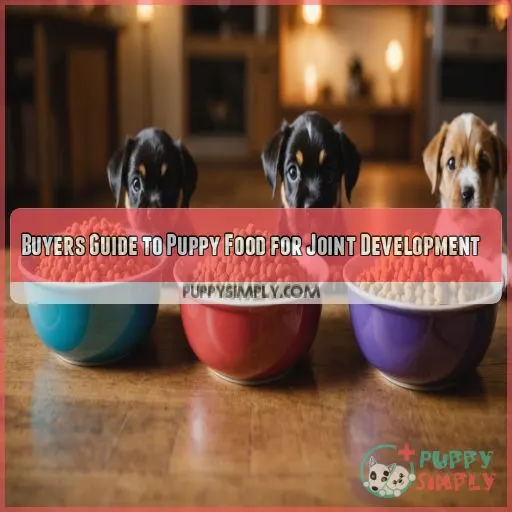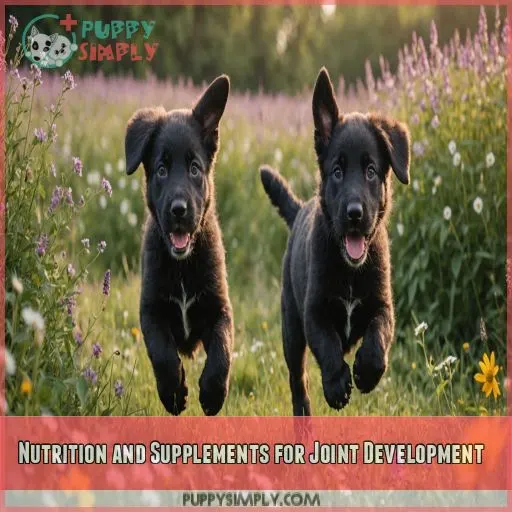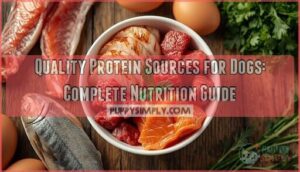This site is supported by our readers. We may earn a commission, at no cost to you, if you purchase through links.

Large breed puppies are especially prone to joint issues, so finding the right balance is key.
Look for foods with controlled calcium levels and high-quality proteins to support healthy growth.
Omega-3 fatty acids and glucosamine can also be beneficial for joint health.
Table Of Contents
- Key Takeaways
- Feeding Large Breed Puppies for Joint Health
- Choosing the Right Ingredients for Joint Development
- Top 4 Puppy Foods for Joint Development
- Buyers Guide to Puppy Food for Joint Development
- Managing Joint Health in Large Breed Puppies
- Nutrition and Supplements for Joint Development
- Frequently Asked Questions (FAQs)
- What foods are good for puppy joints?
- Should you start puppies on joint supplements?
- What food is good for puppy brain development?
- What can I feed my puppy for growth?
- How often should I feed my large breed puppy?
- Can exercise affect joint development in puppies?
- Are there specific breeds more prone to joint issues?
- When should I transition from puppy to adult food?
- How does spaying/neutering impact joint health in puppies?
- Conclusion
Key Takeaways
- You’ll want to choose a food with controlled calcium levels and high-quality proteins for your large breed puppy. Think of it like building a sturdy house – you need the right materials from the start to prevent joint issues down the road.
- Don’t let your pup become a little butterball! Controlled feeding is crucial for joint health. It’s like Goldilocks – not too much, not too little, but just right to keep those joints happy and bouncing.
- Look for ingredients like glucosamine, chondroitin, and omega-3 fatty acids in your puppy’s food. These are like magic potions for joint development, helping to keep your furry friend’s cartilage strong and mobility top-notch.
- Remember, one size doesn’t fit all when it comes to puppy food. You’ll need to consider your pup’s breed, size, and individual needs. It’s like finding the perfect pair of shoes – what fits one pup might not work for another, so don’t be afraid to consult with your vet for personalized recommendations.
Feeding Large Breed Puppies for Joint Health
You’ve got a big pup on your hands, and that means you need to be extra careful about their diet. Feeding your large breed puppy the right food isn’t just about keeping them full, it’s really important for their joint health and can help prevent problems down the road.
Risk Factors of Joint Problems in Large Breed Puppies
Think of joint health in large breed puppies as a tightrope walk between growth rate and genetics.
It’s tricky! Rapid growth can stress joints, leading to hip or elbow dysplasia.
Imagine exercise as Goldilocks: too much, and it’s a problem; too little isn’t great either.
Balance it all with proper nutrition and environment—like assembling a jigsaw puzzle for happy, healthy pups.
The Importance of Controlled Feeding for Joint Health
You’re not just feeding a pup; you’re sculpting a healthy, bouncy future. Controlled feeding is essential for large breed puppies. Think of it as managing backstage nutrition to prevent obesity and support joint health. Carefully orchestrated, calorie-restricted diets help manage puppy growth stages and reduce overfeeding risks, especially during rapid growth spurts.
. After all, nobody wants those chubby paws turning into joint problems later!
Avoiding Overnutrition and Excessive Calorie Intake
Controlle
How Obesity Increases the Risk of Joint Problems
Overfeeding your pup isn’t just about a few extra pounds. It’s like asking your furry friend to carry a backpack full of bricks everywhere they go. That
Calculated Calorie-Restricted Diets for Joint Health
While obesity can spell trouble for your pup’s joints, don
Choosing the Right Ingredients for Joint Development
When choosing puppy food for joint development, it’s really important to pick the right ingredients to help support their growth and long-term health. Remember, avoiding high-calcium diets and ensuring proper phosphorus levels can prevent joint problems down the road because nobody wants a pup with a leg up on arthritis!
Mineral Imbalances and Developmental Orthopedic Disease
Mineral imbalances, particularly with calcium, vitamin D, and phosphorus, can contribute to Developmental Orthopedic Disease (DOD) in large and giant breed puppies. These nutrient levels need to be just right – not too much or too little – to support healthy joint development. Talk to your vet to make sure your pup’s diet has the perfect mineral balance.
Avoiding High Calcium Diets in Large Breed Puppies
You’ll often hear that calcium is
The Importance of Phosphorus Levels in Joint Development
Now that you’ve mastered keeping calcium in check, let’s talk phosphorus, the trusty sidekick in bone health.
A balanced puppy diet should juggle calcium and phosphorus levels like a nutritionist circus act.
Without it, it’s like sending your puppy into a game with missing gear.
Consult a veterinary nutrition specialist to find dog food for joint development ensuring balanced growth stages.
Top 4 Puppy Foods for Joint Development
Choosing
1. Blue Buffalo Jolly Joints Dog Food
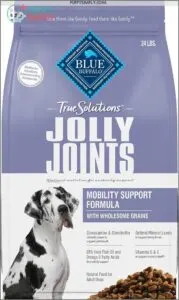
Blue Buffalo’s Jolly Joints dog food is a top pick for your furry friend’s joint health. With real chicken as the star ingredient, it’s packed with glucosamine and chondroitin – the dynamic duo for keeping those puppy joints in tip-top shape. Plus, it’s got EPA from
Best For: Dogs of all ages who need joint support, especially those with active lifestyles or senior dogs.
- Made with real chicken as the first ingredient, providing a high-quality protein source.
- Formulated with glucosamine and chondroitin, clinically proven to support joint health.
- Free of artificial flavors and preservatives, ensuring a healthier and more natural diet for your dog.
- May be more expensive than other dog food brands.
- Some dogs may be sensitive to the fish oil content.
- May not be suitable for dogs with specific dietary restrictions.
2. Iams Mobility Support Dog Food
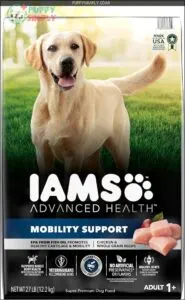
Iams Mobility Support Dog Food is like a joint-friendly superhero for your pup! It’s packed with EPA, glucosamine, and chondroitin to keep those cartilages happy and your furry friend bouncing around like a spring chicken. This
Best For: Iams Mobility Support Dog Food is best for dogs of all breeds who are experiencing joint stiffness or discomfort, or for dogs who are at risk of developing joint problems.
- Supports healthy cartilage and mobility.
- Contains natural sources of glucosamine and chondroitin.
- Veterinarian recommended.
- Some customers report a burnt or rancid odor.
- May not be suitable for all dogs with sensitive stomachs.
- Not available in all flavors or sizes.
3. Hills Prescription Diet Joint Care Dog Food
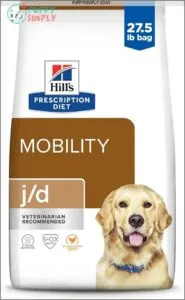
For joint health, Hill’s Prescription Diet j/d Joint Care Dog Food is like a magic carpet for your puppy’s mobility. Specially formulated with glucosamine and chondroitin sulfate, it helps preserve joint cartilage and improves mobility in just 21 days. It’s like giving your pup’s joints a gentle hug, supporting their ability to run, walk, and jump. Just remember, you’ll need a vet’s order to add this treasure to your poochs diet (Source).
Best For: Dogs with joint problems or those at risk of developing them.
- Clinically proven to improve mobility in as little as 21 days.
- Helps preserve joint cartilage.
- Formulated to reduce the risk of developing struvite and calcium oxalate crystals.
- Requires a veterinarian’s order for purchase.
- Can be expensive.
- Amazon’s automatic delivery feature may not be ideal for customers with a lifetime supply.
4. Purina One Joint Health Dog Food
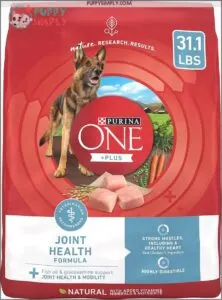
Looking for a tasty way to support your pup’s joint health? Purina ONE Joint Health dog food might be your golden ticket for English Bulldog needs.
. With real chicken as the star ingredient, it’s packed with protein to keep those muscles strong. But
Best For: This food is best for adult dogs who need support for their joints and mobility.
- Glucosamine and fish oil are key ingredients for joint health.
- Real chicken provides a good source of protein for strong muscles.
- Antioxidant support helps boost your dog’s immune system.
- May not be suitable for dogs with allergies to chicken or other ingredients.
- Kibble form might not be ideal for dogs who prefer softer food.
- Price may be higher than some other dog food brands.
Buyers Guide to Puppy Food for Joint Development
Choosing the right food for your puppy’s joint development can feel overwhelming, but don’t worry – we’ve got you covered. In this buyer’s guide, we’ll walk you through the key factors to keep in mind when selecting a puppy food that supports healthy joints, so you can give
Consider Your Puppy’s Breed and Size
Considering your pup’s breed and size is like fitting into the perfect pair of jeans. Large breeds have different needs—growth rate impacts joint stress. Opt for puppy food selection focusing on breed-specific needs for weight management. Choose dog food for immune system support or digestion. Prioritize weight and keep an eye on puppy food for inflammation control.
Consult With a Veterinarian for Recommendations
Your puppy’s size is key, but a vet’s expert eye is worth its weight in gold. They’ll help you navigate the sea
Managing Joint Health in Large Breed Puppies
Managing your large breed puppy’s joint health is essential for their long
Reassessing Portion Sizes for Joint Health
Your pup’s portion sizes aren’t set in stone. As your four-legged friend grows, you’ll need to reassess their meals to keep their joints happy. Overfeeding can lead to rapid growth and extra pounds, putting stress on developing joints. Keep a close eye on your puppy’s weight and adjust portions accordingly.
Transitioning to a New Food for Joint Development
Now that you’ve got your puppy’s portions under control, let’s talk about switching to a joint-friendly diet.
It’s like introducing your pup to a new dance – you’ve got to take it slow!
Start by mixing a small amount of the new food with the old.
Gradually increase the new food over 7-10 days.
Keep an eye out for any tummy troubles or food sensitivities.
Weighing Your Puppy Regularly for Joint Health
Now that you’ve adjusted your pup’s diet, let’s talk about keeping tabs on their weight. It
Increasing Exercise for Joint Health and Development
While weighing your pup’s important
Nutrition and Supplements for Joint Development
Feeding your puppy the right food is really important for healthy joint development, but it’s not always easy to know what’s best. Let’s explore the foods and supplements that can give your pup’s joints a head start, ensuring they grow into strong, active adults.
What Foods Are Good for Puppy Joints
Now that we’ve covered managing joint health, let’s talk about what’s on your pup’s plate. Your furry friend’s joints will thank you for feeding them:
- Omega-3 rich fish like salmon or sardines
- Antioxidant-packed blueberries and sweet potatoes
- Lean proteins such as chicken or turkey
- Bone broth for a collagen boost
Should You Start Puppies on Joint Supplements
Wondering if joint supplements are a good idea for your pup? That’s the million-dollar question! While adding supplements sounds tempting, don’t jump the gun without vet advice. Here’s a quick rundown:
| Factor | Consideration | Example |
|---|---|---|
| Puppy Age | Start at 12 months | Timing |
| Vet Advice | Get professional input | Safety |
| Supplement Types | Chews, powders | Options |
| Supplement Risks | Overuse caution | Balance |
Proceed with care!
Foods for Puppy Brain Development
While joint health is key, don’t forget about your pup’s noggin! Feeding your furry friend’s brain is just as important. Here are some brain-boosting foods to keep your puppy sharp as a tack:
- Omega-3 rich fish like salmon
- Antioxidant-packed blueberries
- Egg yolks for choline
Nutrition for Puppy Growth and Joint Development
With a growing puppy, you’re not just feeding a belly – you’re building bones and joints for life. While homemade diets can be tricky, the right commercial food packs a
Frequently Asked Questions (FAQs)
What foods are good for puppy joints?
Think of puppy joints as the building blocks in a garden wall. Choose foods with glucosamine, chondroitin, and omega-3s to keep them sturdy. Opt for diets formulated for large breed puppies to promote healthy growth.
Should you start puppies on joint supplements?
Generally, you shouldn’t start puppies on joint supplements unless your vet recommends it. Instead, focus on a balanced diet designed for their breed size. If you’re worried, chat with your vet about your pup’s specific needs.
What food is good for puppy brain development?
For your puppy’s brain development, choose foods rich in DHA, an omega-3 fatty acid.
What can I feed my puppy for growth?
For your pup’s growth, choose a high-quality puppy food made for their breed size. You’ll want to balance nutrients, control portions, and avoid overfeeding. Remember, slow and steady growth wins the race for healthy joints!
How often should I feed my large breed puppy?
Like a growing tree needs regular watering, your large breed puppy needs frequent meals. You should feed them 3-4 times daily until 6 months old, then switch to 2-3 meals. It’ll help manage their growth and energy needs.
Can exercise affect joint development in puppies?
Yes, exercise can impact your puppy’s joint development. While it’s important for overall health, too much or too intense exercise can strain
Are there specific breeds more prone to joint issues?
Imagine a Great Dane puppy named Duke, bounding around with his oversized paws. You’d be right to wonder about his joints! Large and giant breeds like Duke are more prone to joint issues,
When should I transition from puppy to adult food?
You’ll want to switch your pup to adult chow around their first birthday. But for large breeds, hold off until 18-24 months. Keep an eye on their growth – when they’re
How does spaying/neutering impact joint health in puppies?
Like
Conclusion
Just as a sturdy foundation is essential for a skyscraper, the right puppy food for joint development is vital for your furry friend’s future.



